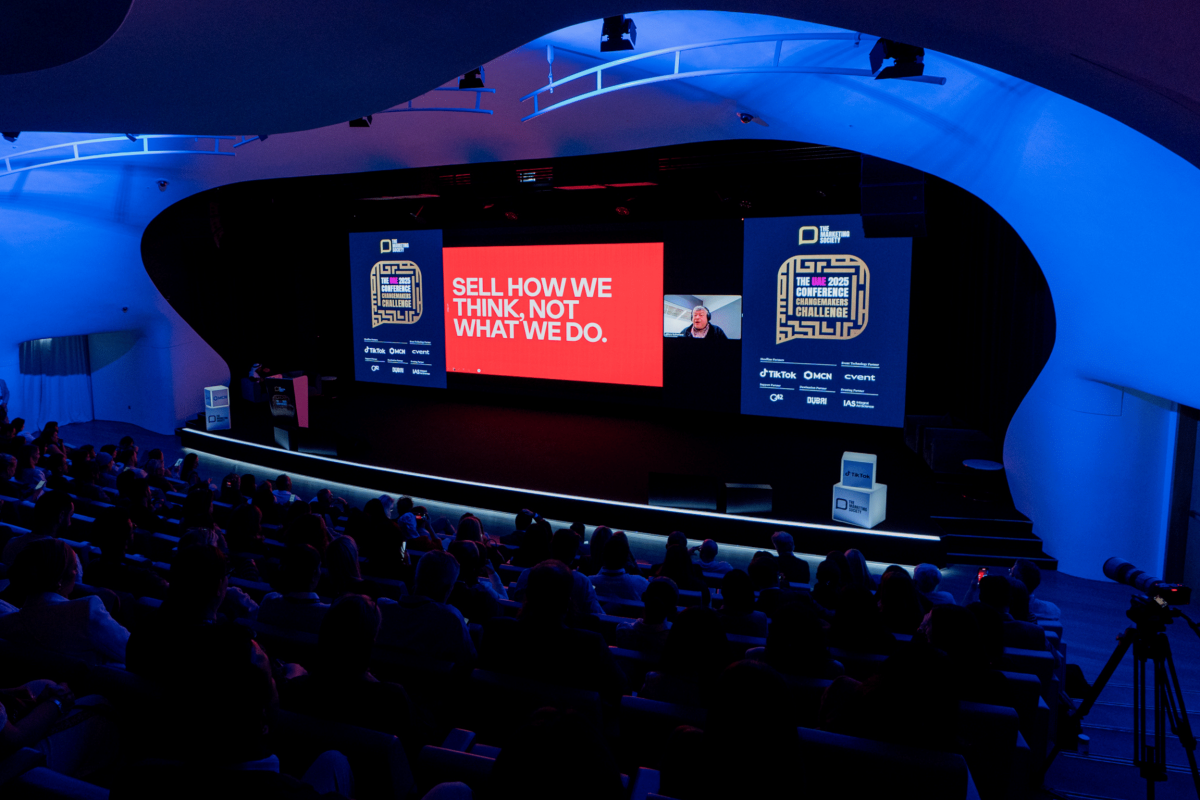Marketing is no longer about what you do, stated Rory, who joined the Conference virtually. Marketing has failed to market itself properly and as a result, it's undervalued by finance, operations and boardrooms everywhere. The solution? Stop selling what you do and start selling how you think.
Rory opened his session with a bold claim: marketing is terrible at marketing itself. We define ourselves by what we do rather than how we think, and that's why finance and operations teams don't respect us. If marketers want a seat at the top table, they need to change the conversation.
The Simple, Big Power of Repackaging
He used Frubes as his opening case study. Yoplait makes yoghurt. Parents wanted to send yoghurt to school with their kids but two problems stopped them. First, yoghurt in pots spills easily, second, kids needed spoons and the spoons never came home. Yoplait solved both by putting yoghurt in a squeezable tube that could be frozen for eight hours. No spillage, no spoon – an entirely new consumption opportunity unlocked. That's repackaging: same product, different container - massive value created.
Rory became well-known by doing the same thing with his work. He didn't set out to rebrand behavioural science for marketers, he just realised that when he talked about psychology instead of posters, people outside marketing paid attention. Finance directors, engineers and CEOs suddenly found his ideas interesting, not because he changed what he did, he just changed how he described it.
The core of his argument is simple: it doesn't matter what things are, it matters how people feel about them. Rory pointed to the feels-like temperature on American weather forecasts. Objective temperature tells you one thing, feels-like temperature factors in wind chill and humidity and that's what people care about. That's marketing thinking - understanding perception, not just reality.
His best example was the London Overground. London has a tube map that everyone uses to navigate the city. For years, certain railway lines existed but weren't on the tube map. Londoners ignored them because railways are for going to Manchester, not getting around London. Transport for London rebranded those lines as the Overground, adding them to the tube map, and calling them a tube line. On the first day, usage went up 400%. The infrastructure didn't change, the psychology did. That's 95% of the value created through perception, not steel.
Small Changes, Big Returns
He shared smaller examples too. Hotels now charge extra for pool access rooms and gym access rooms. Those rooms always existed near the pool and gym but by giving them a name, hotels turned proximity into a feature worth paying for. Airlines charge for speedy boarding. Someone has to board first, why not monetise it? These aren't marketing campaigns. They're marketing thinking applied to pricing and operations.
Rory shared a story about a car hire employee called John in Glasgow. John had the highest customer satisfaction rating in Scotland. When Rory returned his car to a different location, John emailed him to make sure everything was okay - nobody else does that. It's brilliant because it shows someone cares after the transaction is complete. John isn't a marketer but he's thinking like one.
The session ended with a warning. Rory argued that publicly listed companies can no longer build great brands because they're slaves to quarterly earnings and shareholder demands. The best brands today are founder-led or family-owned. They choose their own success metrics and operate on their own timescales. That freedom lets them take risks and build for the long term.
Rory didn't sugar coat it: marketing is undervalued because marketers focus on outputs rather than outcomes. Change the narrative, well how you think, not what you produce. That's how you get the respect you deserve.
5 Key Points from Rory’s session
Repackaging creates value from nothing
Yoplait created Frubes by putting yoghurt in a tube. Parents wanted to send yoghurt in school lunchboxes but couldn't because of spillage and missing spoons. Frubes solved both problems without changing the product - just the packaging. That repackaging created an entirely new market. Marketing magic doesn't require reinvention, it requires reframing.
Perception matters more than reality
The London Overground is the greatest marketing idea in London in 20 years. It cost £200 million to rebrand existing railway lines as tube lines. The Elizabeth line cost £20 billion to build; both carry similar passenger numbers. The Overground created 95% of its value through psychology, not infrastructure. It changed how people felt about the service by adding it to the tube map and calling it the Overground - usage quadrupled overnight.
Marketing thinking works everywhere, not just in marketing departments
Hotels started offering pool access rooms and gym access rooms. Those rooms always existed but by naming them, hotels could charge more. Speedy boarding on airlines is pure genius. Someone has to board first, why not charge for it? Marketing thinking can be applied by anyone in any role. It's not about job titles, it's about understanding how people feel.
Marketers need to sell the way they think, not what they produce
Rory became famous by accident. He stopped talking about posters, campaigns and tactics and started talking about psychology, behavioural science and how humans make decisions. Audiences outside marketing suddenly found it interesting. Engineers, finance teams and CEOs don't care about your campaign, they care about how you think. Sell that.
Public companies can't build great brands anymore
Rory's controversial take: publicly listed companies are now incapable of building interesting brands because they're accountable to shareholders who demand short-term returns. The best brands today are founder-led or family-owned: Dyson, Octopus Energy, SC Johnson. They choose their own metrics and timescales and it’s that freedom that allows them to innovate.
3 Takeaways from the session
Stop defining marketing by tactics, start defining it by thinking
Marketers understand psychology, perception and how people make decisions; that's what makes you valuable.
Look for repackaging opportunities
Sometimes the biggest wins come from reframing what already exists, not building something new.
Perception is reality
How something feels matters more than what it objectively is. Design for feelings, not just facts.

"If you define yourself by what you do, rather than how you think, marketing is a game that only marketers can play. But if you define it by how you think, marketing is a game that anybody can play."
Rory Sutherland
2 Action Items
to take away
Audit how you talk about marketing internally
Are you selling tactics or selling thinking? Shift the conversation to psychology, behaviour and customer understanding.
Identify one repackaging opportunity in your business
What already exists that could be reframed to create more value?



